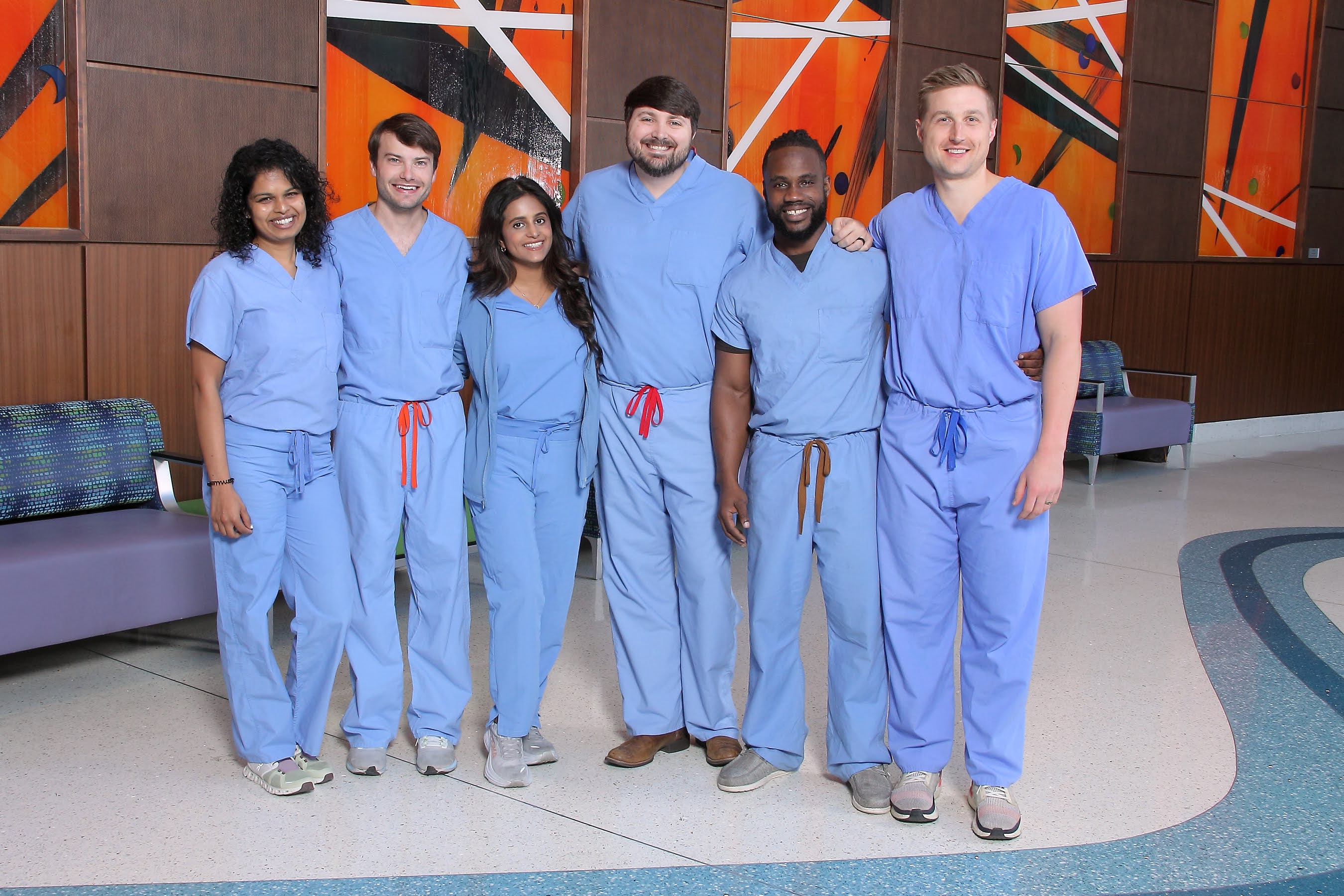
Our fellowship program is designed to provide subspecialty residents in gastroenterology with the background and experience to diagnose and manage patients with acute and chronic diseases of the digestive system (esophagus, stomach, intestines, liver, and pancreas), including those that are life threatening, and to conduct research in this specialized field. Residents will be guided in developing clinical judgment and procedural skills and in acquiring medical knowledge, humanistic qualities, and professional attitudes and behaviors that are appropriate for the pediatric gastroenterologist.
The goals of this program include developing decision making skills in cost-effective, efficient evaluation and management of a wide variety of presenting complaints; to train and develop skills in appropriate laboratory testing, procedures including indications, preparation, techniques and interpretations; and provide mentoring and opportunities for clinical or laboratory based research.
Our clinical curriculum involves broadly based experience with a wide range of pediatric patients having gastrointestinal problems. The patient population is sufficiently varied and complex diseases and volume ensure that residents have the opportunity to become clinically competent in the management of common as well as uncommon gastrointestinal, hepatobiliary, and pancreatic diseases in patients ranging from infancy through young adulthood. A strength of our program is that the subspecialty residents have their own set of patients that they follow continuously in clinic with rotating attendings, rather than rotating through clinics and seeing the patients of attendings. They have ongoing responsibility for the continuing care of patients with chronic gastrointestinal problems and have opportunities to provide consultation on a wide variety of patients to become familiar with the gastrointestinal manifestations of a broad spectrum of pediatric illnesses.
Program Overview
-
The training component will include a core curriculum in the diagnosis, management and treatment of inpatients and outpatients with pediatric gastrointestinal, hepatic, pancreatic and nutritional disorders. The clinical procedural requirements are in alignment with North American Society for Pediatric Gastroenterology, Hepatology and Nutrition’s minimum recommendations for achieving competence, to include EGDs, Colonoscopies, Liver Biopsies, Paracentesis; and exposure to other interventional procedures, i.e. PEGs, Sclerotherapy, Banding and Capsule Endoscopy.
The implementation of the curriculum will be through mentoring; inpatient care and consultations using the family-centered care model; GI procedures; formal didactic teaching and directed reading and discussion. The Fellow will spend at least one half day per week for the entire 3-year period in an ambulatory care clinic in which both new and continuing care patients are seen. There will also be the opportunity to work with a multidisciplinary team, consisting of; Faculty and support staff of PNP’s, Nurses, GI Lab, Nutrition Support, Social Services, including interaction with Pediatric Surgery, Pathology, and Radiology services.Breakdown of the 3-year fellowship
-
1st Year Clinical- Inpatient rotation, outpatient clinical responsibility, procedural skill development.
-
2nd and 3rd years for development of research project leading to publication in a peer reviewed journal, ongoing outpatient continuity clinical responsibilities, and a rotation as attending in 3rd year.
First Year
10 months Inpatient GI
2 months elective
6 months General GI Clinic
6 months Subspecialty Clinic
Second Year
10 months Research
2 months Inpatient GI
6 months General GI Clinic
6 months Subspecialty Clinic
Third Year
10 months Research
6 weeks Inpatient GI
12 months General GI Clinic -
-
Competency 1: Patient Care
Provide family-centered patient care that is development- and age-appropriate, compassionate, and effective for the treatment of health problems and the promotion of health.
Competency 2: Medical Knowledge
Understand the scope of established and evolving biomedical, clinical, epidemiological and social-behavioral knowledge needed by a pediatrician; demonstrate the ability to acquire, critically interpret and apply this knowledge in patient care.
Competency 3: Interpersonal Skills and Communication
Demonstrate interpersonal and communication skills that result in information exchange and partnering with patients, their families and professional associates.
Competency 4: Practice-based Learning and Improvement
Demonstrate knowledge, skills and attitudes needed for continuous self-assessment, using scientific methods and evidence to investigate, evaluate, and improve one's patient care practice.
Competency 5: Professionalism
Demonstrate a commitment to carrying out professional responsibilities, adherence to ethical principles, and sensitivity to diversity.
Competency 6: Systems-based Practice
Understand the role of members of the multidisciplinary health care team dealing with children with gastrointestinal problems.
-
Our clinical curriculum involves broadly based experience with a wide range of pediatric patients having gastrointestinal problems. The patient population is sufficiently varied with adequate volume to ensure that residents have the opportunity to become clinically competent in the management of common, as well as uncommon gastrointestinal, hepatobiliary, and pancreatic diseases. A strength of our program is that the Fellows have their own set of patients that they follow continuously in clinic with attending supervision, which allows for improved continuity and patient ownership. They have ongoing responsibility for the continuing care of patients with chronic gastrointestinal problems and have opportunities to provide consultation on a wide variety of patients to become familiar with the gastrointestinal manifestations of a broad spectrum of pediatric illnesses.
Multidisciplinary patient centered programs:
-
Colorectal Program
-
Intensive Feeding Program
-
Intestinal Rehabilitation Program
State of the art GI laboratory and endoscopy facilities perform number of diagnostic and therapeutic procedures which include:
-
Upper and lower endoscopy with biopsies
-
Polypectomies
-
Variceal Sclerotherapy and Banding
-
Foreign body removal from upper GI tract
-
PEG Placement
-
Dilatations
-
Percutaneous liver biopsies
-
Ph/impedance study
-
Hydrogen Breath Testing
-
Anorectal Motility Testing
-
Translational Endoscopies
-
The Fellow will also have opportunities for intra-and extra departmental research and collaboration, especially with Adult GI program and Liver Transplant Program. There will be specialized rotations with Adult Gastroenterology and the Liver Transplant Service. The Fellow will have the opportunity to rotate through several multi-disciplinary clinics, including Eosinophilic disorders, Feeding Therapy, Inflammatory Bowel Disease, Colorectal Clinic, Intestinal Rehabilitation, Liver Transplant, and the AeroDigestive Program.
-
From the research perspective, the Fellow will learn basic research principles in which to develop a project, follow it through completion, and prepare the project for publication and presentation. The Fellow will have the opportunity to be both a student and teacher, as they will be involved in teaching residents and students. They will have supervised instruction in providing consultative services and communication with other physicians and other members of the healthcare team.
Division Research Activities
Faculty:
-
Simulation as a teaching tool in Pediatric Gastroenterology
-
Cohort Study of Disease Education and Medication Adherence in patients attending a specialized Pediatric Inflammatory Bowel Disease Clinic
Fellows:
-
Eosinophilic Esophagitis: Analyzing the Microbiome
-
-
Our fellowship program is designed to provide Fellows in gastroenterology with the background and experience to diagnose and manage patients with acute and chronic diseases of the digestive system (esophagus, stomach, intestines, liver, and pancreas), including those that are life-threatening, and to conduct research in this specialized field. Fellows will be guided in developing clinical judgment and skills and in acquiring medical knowledge, humanistic qualities, and professional attitudes and behaviors that are appropriate for the pediatric gastroenterologist.
The goals of this program include developing decision making skills in cost-effective methods, and efficient evaluation and management of a wide variety of diseases. We will groom Fellows to develop skills in appropriate laboratory testing procedures, including indications, preparation, techniques and interpretations. Our program provides mentoring and opportunities for clinical or laboratory based research as well.
Current Division QI Projects
-
Constipation Project
-
No Show Project
-
OR Utilization
-
-
Peds GI Seminar Series
Held every Tuesday at 11:45a.m. - 1:00p.m.Pathology Conference
Held every Friday at 7:30 - 8:00a.m.GI Radiology Conference
Quarterly -2nd Friday of every third month at 1:30 – 2:30p.m.
Our Team

David Galloway, M.D.
dpgalloway@uabmc.edu
205-638-9918

Diana Montoya Melo, M.D.
